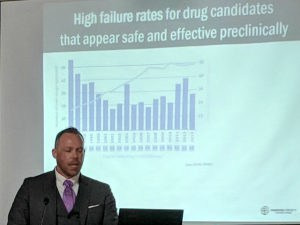14 January 2019
 In November 2018, India joined other innovative economies working to replace the use of animals in laboratory experiments with the launch of the Indian Society for Alternatives to Animal Experiments (ISAAE) during the country’s second national conference on alternatives in New Delhi. Humane Society International, founder of the BioMed21 Collaboration, was a lead sponsor and keynote speaker at the conference, which created a platform for national and international scientists from various backgrounds to engage in discussions pertaining to the present and future of alternatives to the use of animals in research and testing.
In November 2018, India joined other innovative economies working to replace the use of animals in laboratory experiments with the launch of the Indian Society for Alternatives to Animal Experiments (ISAAE) during the country’s second national conference on alternatives in New Delhi. Humane Society International, founder of the BioMed21 Collaboration, was a lead sponsor and keynote speaker at the conference, which created a platform for national and international scientists from various backgrounds to engage in discussions pertaining to the present and future of alternatives to the use of animals in research and testing.
The chief guest of the event, Dr Renu Swarup, Secretary of the Department of Biotechnology, graced the inaugural ceremony with an encouraging speech for the audience, comprised of scientists and students alike. The informative keynote lecture by HSI Vice President of Research & Toxicology, Troy Seidle, kickstarted the event, focusing on the need for human biology-based pathways to study human diseases and test new products, and exploring the vision of expediting 21st century science through the BioMed21 Collaboration. A host of eminent speakers lectured on current projects and progress in human-relevant methods, such as in vitro high-throughput screening, systems biology, stem cell research, tissue engineering, and more. Poster sessions allowed established scientists and young researchers to further share ideas and knowledge and the conference concluded with a panel discussion on how to improve collaboration between industries and regulators.
The conference also provided a platform for launching the latest BioMed21 funding call aimed specifically at Indian scientists. This latest call invites proposals examining the state of the science in a specific area of human biomedicine, with a specific focus on those diseases that represent major health concerns in India. Applicants are required to assess current understanding of underlying pathophysiological pathways and networks, and to critically evaluate the human relevance, translational success and limitations of conventional research models.
The event brought an emboldening close to 2018, followed by an invigorating anticipation for a new 2019, which will open various avenues to innovation and development dedicated to human biology-centric health research.

Post a comment